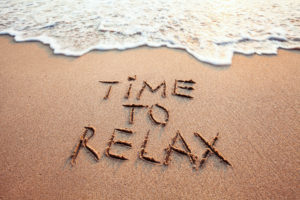It’s become increasingly essential to our health that we actively schedule time away from work. Taking personal time to recharge has myriad benefits to your mental health
Most people view the term “hard-working” as a badge of honor, a beloved quality that you would want in just about anyone, be it a teammate, classmate, coworker, employee, or life partner. After all, it implies a determination and an active commitment to an end-goal, and is the antithesis of terms we have come to think of as pejorative, like “complacent,” “passive,” or “lazy.”
Our culture has praised and perpetuated the importance of hard work as part of The American Dream for decades, with the alluring promise that unparalleled success, wealth, and status are all attainable for anyone willing to roll up their sleeves and put in the effort. This idea has more recently morphed into what some term the “hustle” culture, which encourages the prioritization of work above just about everything else. Anything that isn’t work-related – taking a break, getting a good night’s sleep, or doing anything recreational – is framed as a distraction.
The influence of this culture is evident. The United States is the only industrialized nation that does not mandate paid leave for its working citizens. A survey from earlier this year showed that less than half of American workers are offered paid vacation through their employers, and those that were left an average of 9.5 vacation days unused by the end of 2021.
This kind of lifestyle that has us firing on all cylinders with insufficient time to rest and recover is unsustainable for most people and seriously detrimental to our mental and physical health. Chronic, prolonged stress can lead to irritability, sleeplessness, problems with memory, and development of anxiety disorders. A study from the World Health Organization found that people who worked 55 hours or more per week were at a 35 percent higher risk of stroke and 17 percent higher risk of dying from heart disease than those who worked between 35 and 40 hours per week.
Burnout was reported by nearly 80 percent of Americans across a range of professions in 2021. The coronavirus pandemic has undoubtedly had an exacerbating effect, as many people who transitioned to working from home saw a blurring of the lines between work time and personal time.
It’s become increasingly essential to our health that we actively schedule time away from work. Whether jet-setting to a remote tropical paradise, scheduling a weekend getaway with your friends or family, or just powering down your electronic devices to spend a few quiet, mindful days at home, taking personal time to recharge has myriad benefits to your mental health.

If your work environment is causing you to feel stressed, sometimes spending some time away from that environment is enough to lower those stress levels. Research shows that even a relatively short vacation can lead to reduced feelings of stress for over a month afterwards. You don’t have to travel far to get benefits either; a simple walk in the woods has been shown to have restorative effects, improving memory and attention, and reducing anxiety.
Sleep is enormously important for maintaining your mental health. When you sleep, your brain continues working to process the emotional information that you take in during waking hours. Certain work habits can interfere with the ability to get a restful night’s sleep, like consistently working until late at night or staring at a phone or computer screen while in bed. Taking a vacation can interrupt those bad habits and allow you to get the rest you need.
Though it may seem counterintuitive, spending too much time working can actually result in less productivity, as burnout sets in and your stress impairs your ability to perform your duties. One study found participants showed increased creativity and “cognitive flexibility” after returning from a summertime vacation. Taking a break could be the key to rediscovering your passion for your job, and becoming an even better worker.
If you don’t have the time or the budget to actually take a lengthy vacation, you may want to go ahead and plan an itinerary, anyway. There is research to suggest that planning something fun and relaxing does our brains almost as much good as participating in it, and just the anticipation of a recreational experience can lead to prolonged feelings of excitement and happiness.
Our mental health is inextricably linked to our physical health. Regularly taking care of our mental health makes us better prepared to handle everything that the world throws at us, from the day-to-day stressors to the catastrophic emergencies. Doing what we can to improve our emotional wellbeing and taking steps to make sure we are mentally healthy are essential to living the fullest lives we can. So if you are thinking of skipping a vacation this year, do yourself a favor and think again!
Our partners at Work2BeWell have complied a list of resources for understanding and responding to mental health concerns. By understanding mental health and wellness, we can take action to support one another, reduce stigma, and promote resilience.
National Alliance on Mental Illness (NAMI): There are 650 NAMI State Organizations and NAMI Affiliates across the country. Many NAMI affiliates offer an array of free support and education programs
NAMI Resource Center: Get access to dozens of mental health resources
ReachOut.com: Information on a variety of mental health resources as well as reputable resources for those in need
When to Reach Out for Help Video: From Kati Morton, this video provides guidance if you are unsure about if or when to reach out for help regarding your mental health
CDC Tips for Coping with Stress: Learning healthy ways to cope and getting the right care and support can help reduce stressful feelings and symptoms
99 Coping Strategies Poster: Need even more tips for coping with stress? Download this poster to get 99 ideas
CredibleMind: An online platform that provides curated sets of the highest quality resources for you to explore
Psych Hub: An online platform providing free, engaging videos about mental health, substance use, and suicide prevention
5 Mental Health Apps Worth Your Consideration: There’s no shortage of mobile apps you can download to help you manage anxiety or monitor your state of mind. But how can you choose which one best suits you?
Work2BeWell ECPR Module: Sometimes, it’s helpful to collect wellness resources that help you together in one easily accessible spot. Here is a link to Work2BeWell’s ECPR kit guide, where you can “store” wellness materials that positively benefit you when you are struggling.






